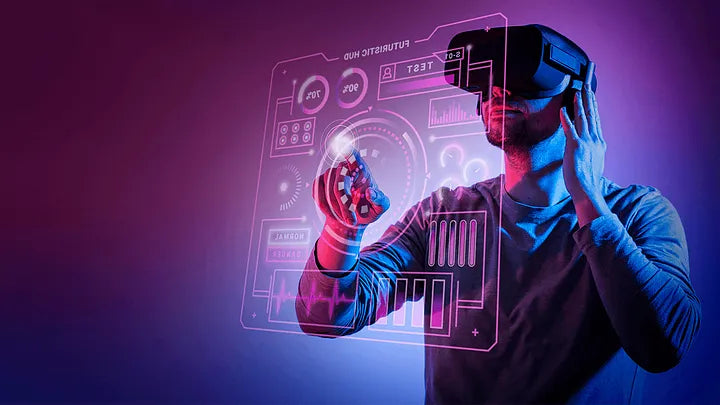
The Rise of the Metaverse: Exploring Virtual Worlds and Digital Economies
Share
The concept of the Metaverse, a collective virtual shared space created by the convergence of virtually enhanced physical reality and physically persistent virtual spaces, is quickly becoming a reality. Fueled by advancements in technology and a growing interest in immersive digital experiences, the Metaverse is poised to revolutionize how we interact, socialize, work, and even live. This article delves into the rise of the Metaverse, its potential impact on society, and the emergence of digital economies within these virtual worlds.
Understanding the Metaverse
The term "Metaverse" was first coined by author Neal Stephenson in his 1992 science fiction novel Snow Crash, where it referred to a virtual reality-based successor to the internet. Today, the Metaverse is evolving into a vast, interconnected network of virtual environments where users can interact with digital objects, environments, and other users in real-time.
The Metaverse is being built on several key technologies:
- Virtual Reality (VR) and Augmented Reality (AR): VR and AR are the foundational technologies that create immersive digital experiences, allowing users to interact with the Metaverse as if they were physically present in it. Devices like VR headsets and AR glasses enable users to enter and navigate these virtual worlds.
- Blockchain Technology: Blockchain plays a critical role in the Metaverse by providing a decentralized and secure way to manage digital assets, identities, and transactions. Non-fungible tokens (NFTs) and cryptocurrencies are key components of the Metaverse's digital economy.
- Artificial Intelligence (AI): AI powers many aspects of the Metaverse, from creating realistic virtual environments and characters to enabling natural language processing and real-time interactions with digital avatars.
- 5G and Edge Computing: The widespread adoption of 5G networks and edge computing technology ensures low-latency, high-speed connectivity, making it possible for users to seamlessly access and interact with the Metaverse from anywhere.
The Emergence of Virtual Worlds
Several companies and platforms are leading the charge in creating expansive virtual worlds that form the backbone of the Metaverse. These virtual worlds offer users a wide range of experiences, from socializing and gaming to education and commerce:
- Second Life: One of the earliest virtual worlds, Second Life, has been a pioneer in creating a persistent online environment where users can create avatars, build virtual homes, and participate in a digital economy.
- Decentraland: Decentraland is a blockchain-based virtual world where users can buy, sell, and trade digital real estate using cryptocurrency. The platform's decentralized nature allows users to create and monetize their own content, from virtual art galleries to interactive games.
- Roblox: Roblox is a massively popular online platform that enables users to create and play games developed by other users. The platform's success has turned it into a thriving digital economy, where creators can earn real money through in-game purchases.
- Fortnite: While initially known as a battle royale game, Fortnite has evolved into a social platform where users can attend virtual concerts, watch movies, and interact in a variety of virtual spaces. Fortnite's in-game currency, V-Bucks, is a key part of its digital economy.
Digital Economies in the Metaverse
One of the most significant aspects of the Metaverse is the emergence of digital economies, where users can create, buy, sell, and trade virtual goods and services. These digital economies are powered by blockchain technology, which ensures secure ownership and transfer of digital assets:
- Non-Fungible Tokens (NFTs): NFTs are unique digital assets that represent ownership of a specific item, such as a piece of virtual art, a collectible, or a plot of virtual land. NFTs have gained immense popularity, with some selling for millions of dollars, and are a key component of the Metaverse's economy.
- Cryptocurrencies: Cryptocurrencies like Bitcoin, Ethereum, and others are used as the primary medium of exchange within the Metaverse. These digital currencies enable users to buy virtual goods, pay for services, and invest in digital assets.
- Virtual Real Estate: Virtual real estate has become a hot commodity in the Metaverse, with users buying and selling parcels of digital land in platforms like Decentraland and The Sandbox. These virtual properties can be developed, rented out, or resold for profit.
- Play-to-Earn Models: The rise of play-to-earn games, where users can earn cryptocurrency or NFTs by playing games, has created new opportunities for individuals to generate income in the Metaverse. This model is particularly popular in developing countries, where it offers a new source of livelihood.
The Impact of the Metaverse on Society
The rise of the Metaverse has far-reaching implications for society, both positive and negative:
- Social Interaction: The Metaverse offers new ways for people to connect and interact, breaking down geographical barriers and creating global communities. However, it also raises concerns about digital addiction and the potential for people to become disconnected from the physical world.
- Economic Opportunities: The digital economy of the Metaverse is creating new opportunities for entrepreneurship, innovation, and wealth generation. However, there are concerns about economic inequality and the potential for monopolistic control by a few large tech companies.
- Privacy and Security: The Metaverse raises significant privacy and security challenges, as users' digital identities, transactions, and interactions become part of the virtual world. Ensuring robust data protection and preventing cybercrime will be critical.
- Cultural and Ethical Considerations: As the Metaverse evolves, it will raise important cultural and ethical questions, such as the ownership of digital assets, the rights of digital avatars, and the potential for exploitation in virtual environments.
The Future of the Metaverse
The Metaverse is still in its early stages, but its potential is vast. As technology continues to advance, the Metaverse will become more immersive, interconnected, and accessible. Major tech companies, including Facebook (now Meta), Microsoft, and Google, are heavily investing in the development of the Metaverse, signaling its importance as the next frontier of digital innovation.
In the future, the Metaverse could transform industries such as entertainment, education, healthcare, and commerce. Virtual reality classrooms could provide immersive learning experiences, telemedicine could enable remote patient care in virtual environments, and virtual storefronts could offer personalized shopping experiences.
Conclusion
The rise of the Metaverse represents a new era of digital interaction, where virtual worlds and digital economies are becoming an integral part of our lives. While the Metaverse offers exciting possibilities for innovation and economic growth, it also presents challenges that must be addressed. As we move forward, it will be essential to navigate the ethical, social, and economic implications of the Metaverse to ensure it develops in a way that benefits everyone.
